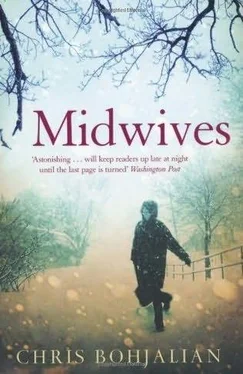Chris Bohjalian - Midwives
Здесь есть возможность читать онлайн «Chris Bohjalian - Midwives» весь текст электронной книги совершенно бесплатно (целиком полную версию без сокращений). В некоторых случаях можно слушать аудио, скачать через торрент в формате fb2 и присутствует краткое содержание. Жанр: Современная проза, на английском языке. Описание произведения, (предисловие) а так же отзывы посетителей доступны на портале библиотеки ЛибКат.
- Название:Midwives
- Автор:
- Жанр:
- Год:неизвестен
- ISBN:нет данных
- Рейтинг книги:5 / 5. Голосов: 1
-
Избранное:Добавить в избранное
- Отзывы:
-
Ваша оценка:
- 100
- 1
- 2
- 3
- 4
- 5
Midwives: краткое содержание, описание и аннотация
Предлагаем к чтению аннотацию, описание, краткое содержание или предисловие (зависит от того, что написал сам автор книги «Midwives»). Если вы не нашли необходимую информацию о книге — напишите в комментариях, мы постараемся отыскать её.
Midwives — читать онлайн бесплатно полную книгу (весь текст) целиком
Ниже представлен текст книги, разбитый по страницам. Система сохранения места последней прочитанной страницы, позволяет с удобством читать онлайн бесплатно книгу «Midwives», без необходимости каждый раз заново искать на чём Вы остановились. Поставьте закладку, и сможете в любой момент перейти на страницу, на которой закончили чтение.
Интервал:
Закладка:
Nevertheless, I've always understood why a lawyer has faith in logical inference, the idea that one doesn't need to hear or see it rain overnight to know in the morning that it did rain if the cars and the ground and the trees are all wet.
And so I believe Stephen may have tried to kiss my mother by the way I heard her saying to him, "No, it's not just the place. It's everything. If I sent you those signals, I'm sorry. I'm really and truly sorry."
Before I became a doctor, I couldn't imagine why anyone would become a coroner. I assumed that anyone willing to spend that much time around corpses was inordinately fixated on death or-at best-had never outgrown a nine-year-old boy's interest in vampires and mummies and ghouls. Only after I'd started medical school did the fascinations of that job become apparent to me, and the reasons why so many profoundly-at least outwardly-normal people choose it as their life's work. It's like being a detective. And once you're past your first cadaver, human tissue loses its ability to shock, and organs and bones become routine.
When I was fourteen, however, I imagined a coroner had to be a very sick person. And so I was unprepared for the medical examiner for the state of Vermont when a bailiff escorted him between the two rows of packed benches in the courtroom mid-Friday afternoon, and led him to the witness stand. Terry Tierney looked like any one of the fathers I knew in Reddington who coached Little League baseball in the spring and Pop Warner football in the fall: energetic but patient in carriage, and downright unexceptional in appearance. He was a good decade older than my parents, with a black beard that was graying and eyeglasses very much like Stephen's.
He smiled when Bill Tanner greeted him, and-at Tanner's prodding-explained for the jury his litany of degrees and accomplishments. The two were so chummy that for a few moments I almost expected them to start discussing the deer hunting they could expect later that fall.
When they finally got around to the scene that had greeted Tierney when he walked into the Bedfords' bedroom back in March, however, all of that changed, and Tierney grew serious. He described the way my mother had stitched the exterior incision she'd made and then pulled the woman's nightgown back down over her torso.
"Did Mrs. Danforth tell you how Charlotte Bedford had died?" Bill Tanner asked.
"She said the lady had had a stroke."
"What did you think?"
"I thought it was possible. Anything's possible in a home birth."
"Objection!" Stephen said, shooting up from his seat, and the judge sustained it.
"When did you conduct the autopsy?" Tanner continued, as if there had never been an interruption.
"Later that morning."
"Did you find any indication that the woman had had a stroke?"
"No."
"If Charlotte Bedford had had a stroke, would you have been able to determine that from an autopsy?"
"Definitely. Absolutely."
"Why?"
Dr. Tierney sighed and gathered his thoughts. Looking back, I believe he was merely pausing to frame his answer in a way that would convey the details of postmortem dissection without sickening the jury. But at the time I thought his hesitation was driven by sadness.
"When I examined the brain, I would have found significant changes. I would have seen hemorrhaging-bleeding. The tissue would have softened; it would have gotten almost spongy."
"And you saw none of that-no bleeding, no softening-when you were examining Charlotte Bedford's brain?"
"No, I did not."
Tanner returned to his table, and his deputy handed him what I assumed were his notes.
"Did you examine Charlotte Bedford's abdominal area?"
"Yes."
"Beginning with the incision?"
"That's right."
"Including her reproductive organs?"
"Of course."
"You mentioned Mrs. Danforth had sewn up the skin where she had cut Charlotte open. Did she sew up her internal organs as well?"
"No."
"She didn't sew up the uterus?"
"No."
"Why not?"
"Objection," Stephen said. "Calls for speculation."
"Sustained."
"So you found the uterus had not been repaired," Tanner continued.
"No, it had not."
"Could you tell where in the birth canal the baby had been when Mrs. Danforth pulled him from his mother?"
"No."
"Could you tell if the baby had descended at all in all those hours Mrs. Danforth forced Charlotte to push?"
"Objection, no one forced anyone to do anything."
"Sustained."
Tanner smiled for the jury's benefit, a grin more mischievous than chastened.
"Could you tell if the baby had descended at all in all those hours Charlotte was pushing?"
"No, I could not tell."
"Could you tell if there had been a placental abruption?"
"Yes, definitely. There were areas of hemorrhage."
"Was that the cause of death?"
"No. As it occasionally does, it had clotted over. Started to heal itself."
"Was it a factor in Charlotte Bedford's death?"
"It would become one indirectly."
Tanner glanced at his notes and grew quiet. Finally: "How so?"
"The woman had lost some blood during that event. Given the cesarean that would be performed a few hours later, it's impossible to gauge how much. But it was probably a significant amount."
"Meaning?"
"Her body was weaker. She wasn't as strong."
"Why might that matter?"
"As any mother knows, labor's hard work. Incredibly hard work. A woman needs all the strength she can muster, especially if something… something unforeseen occurs."
"Did something unforeseen occur in this case?"
"I assume you mean other than the poor woman dying."
"Right."
"Then yes, clearly something unforeseen happened."
"Based on the autopsy you performed, and all of the subsequent laboratory work, what do you think that something was?"
As if he were recalling an event as common as a drive home on slick roads in a blizzard-hazardous, perhaps, but an endeavor everyone in that courtroom had endured and could discuss comfortably at a dinner table-he said, "Well, although there was no medical evidence of a stroke, there were eyewitnesses who saw what apparently looked like a stroke to someone who wasn't a doctor. The woman twitched or spasmed, and then blacked out. The father saw it, the young lady-the apprentice-saw it, and of course Mrs. Danforth saw it. But I don't believe it was an aneurysm that caused the spasm."
"Do you have an opinion as to its cause?"
"Yes."
"Would you tell us what that is?"
"To use Dr. Lang's expression, I think the woman 'vagaled.'"
"Would you elaborate?"
"Right here, in the small of the back of our heads," Tierney said, motioning to the spot on his own head with his hand, "there is a pair of cranial nerves filled with motor and sensory fibers. Those are the vagus nerves. They innervate a variety of organs and muscles-the larynx, for example, and many thoracic and abdominal viscera."
"What does that mean in layman's terms?"
Tierney offered the jury a small, self-deprecating smile. "They communicate between the brain and the heart. They help to carry the information from the brain to the heart about how fast or slow it's supposed to beat. Now, like everything else in the body, the brain needs oxygen. And oxygen is carried to the brain in the blood-blood pumped, of course, by the heart. If the brain isn't getting enough oxygen-if it becomes what we call hypoxic-it doesn't function properly. Or at all. Obviously, there are lots of things that can cause a brain to become hypoxic, including even a planned medical event like general anesthesia. But another cause may be labor, and the way a woman has to push. You take in these very deep breaths, work very hard, and then you exhale at once. And you do this for hours. Suddenly, before you know it, your brain is going hypoxic."
Читать дальшеИнтервал:
Закладка:
Похожие книги на «Midwives»
Представляем Вашему вниманию похожие книги на «Midwives» списком для выбора. Мы отобрали схожую по названию и смыслу литературу в надежде предоставить читателям больше вариантов отыскать новые, интересные, ещё непрочитанные произведения.
Обсуждение, отзывы о книге «Midwives» и просто собственные мнения читателей. Оставьте ваши комментарии, напишите, что Вы думаете о произведении, его смысле или главных героях. Укажите что конкретно понравилось, а что нет, и почему Вы так считаете.











